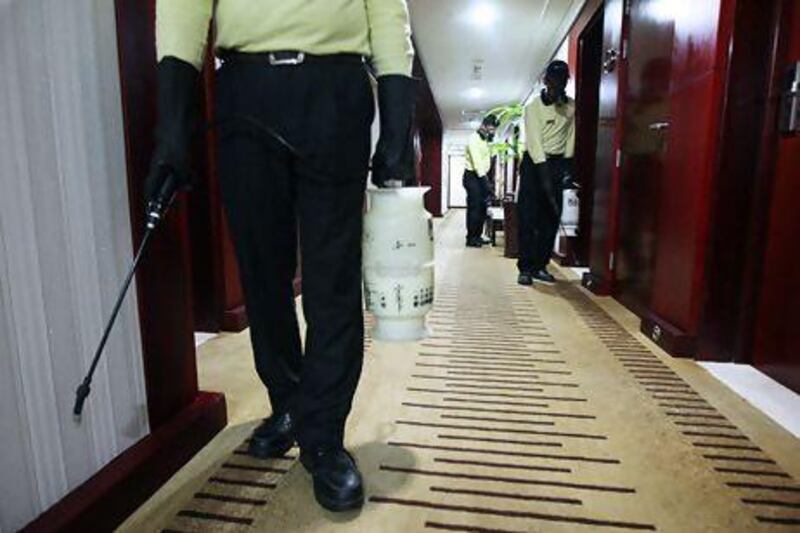People are risking their lives by using cheap but unlicensed pest-control companies, industry experts warn.
Control over the industry has improved but unregistered businesses still operate, sometimes using banned substances that can be life-threatening if incorrectly handled.
"Every day a new pest-control company pops up from somewhere," said Dinesh Ramachandran, technical manager at National Pest Control, which has offices in Dubai, Abu Dhabi and Sharjah.
Some operate illegally and pose a threat to the public but prove popular because they charge as little as Dh50.
"These companies are damaging the image of pest control in the eyes of the public," Mr Ramachandran said, stressing that applying pest-control chemicals safely requires specialist knowledge.
Two five-month-old babies died in Ajman in 2010 after improper use of an insecticide by a pest-control company at a neighbour's flat.
Since then controls on the industry have been improved, especially in Dubai, where authorities carry out more frequent inspections on companies' credentials and the pesticides they use, said Bartholian Pereira, managing director of Elite Xpress Cleaning and Pest Control, which has offices in Dubai and Abu Dhabi.
He warned that banned chemicals were being used after being brought into the country illegally, and that unlicensed companies were still able to advertise their services in the classified sections of some newspapers.
"Sometimes we find some pesticides coming from Iran and Pakistan. It is difficult to stop them," said Mr Pereira.
The Centre for Waste Management-Abu Dhabi (CWM) said there were 122 pest-control companies registered in Abu Dhabi. The centre is working with the National Media Council to prevent non-authorised companies from advertising, by requiring businesses to present their licence before such adverts can run.
The centre said the new procedure had been published in all local papers and that it was working with the Economic Development Department to stop any company operating without a licence.
Legitimate companies must meet a number of Government requirements before they can operate.
In Dubai, a company must employ a supervisor who has a university degree in biology or entomology, or a master's degree, as well as a minimum of one year's work experience. Staff undergo examinations before working in the field and any chemicals used must be registered with the Ministry of Environment and Water.
In the capital, companies must register with the CWM. They are required to hire an agronomist, specialising in pest control, and have facilities certified to store pesticides.
There are also regulations regarding how pesticides should be transported and how waste generated by companies should be disposed of.
Both Mr Pereira and Mr Ramachandran advising making background checks before hiring a company, such as asking for a trade licence.
In Dubai, pest-control technicians are issued identification cards.
Dubai Municipality grades companies on factors including their technical ability, technicians' level of knowledge, and the vehicles and products they use. The records are available upon request.
"People should not be choosing a company based on price only," said Mr Ramachandran. "It also goes down to how much due diligence a company puts into its operations, staff training and research and development."





